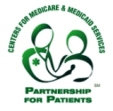| Bev Johnson AHRQ Interview Connects Patient- and Family-Centered Care to Patient Safety |

In February 2013, Dr. Robert Wachter, Editor, the Agency for Healthcare Research and Quality, interviewed Bev Johnson, President and Chief Executive Officer of the Institute for Patient- and Family-Centered Care. In the interview, Bev spoke about the relationship between patient- and family-centered care and patient safety, quality of care, and improving the patient experience of care.
According to Bev, patients and families can learn, acquire information, and become more involved in their own health care to the extent that they choose. Their preference may change over time, but clinicians can set the stage for this choice. "The skill set for encouraging participatory involvement can be taught to clinicians—how to connect with a patient and family at the level they prefer, help them see how they can make decisions that can enhance the quality of their life, and support them in managing their acute or chronic condition."
Bev noted several organizational changes that can have a huge positive impact on safety, quality, and the patient experience. First is for health care professionals to stop viewing families as visitors in hospitals. According to Bev, "We've done a disservice and put patients at great risk by labeling families as visitors. Families need to be seen as allies for quality and safety."
Another great lever for change is revamping the way rounds are conducted. Interdisciplinary rounds can be "done at the bedside, with patients and families supported and encouraged to be part of the dialogue and the decision-making..." Not only does this impact the experience of care, but it also leads to improvements in patient safety and constructively influences the education of medical professionals.
A third change that can have a positive impact is identifying, recruiting, and preparing patients and families who can serve in productive, helpful ways as patient and family advisors, such as serving on key quality and safety committees. These advisors share perspectives and insights that are different than health care professionals. According to Bev, the "mindset that we're in a partnership together, we make decisions together, we share information together, we work on the safety team together in direct care, and the patient is not excluded at care planning times...sets a different tone in the [clinician and patient/family] relationship. Patients, families, staff, and clinicians can then be more candid with each other in a respectful way...It's not only collaboration in the clinical encounter, but also collaboration in patient safety, quality improvement, in the development of policies and programs, in the education of the next generation of clinicians and staff, and in research."
Listen to the entire interview with Bev Johnson.
|
| Institute's Annapolis Intensive Training Seminar Welcomes Hospital Engagement Network (HEN) Hospitals |
 The Institute is delighted that 250 of the more than 400 participants of the upcoming Moving Forward with Patient- and Family-Centered Care: Partnerships for Quality & Safety—An Intensive Training Seminar, to be held April 15-18, 2013, in Annapolis, MD, are from hospitals that are affiliated with a Hospital Engagement Network. The Institute is delighted that 250 of the more than 400 participants of the upcoming Moving Forward with Patient- and Family-Centered Care: Partnerships for Quality & Safety—An Intensive Training Seminar, to be held April 15-18, 2013, in Annapolis, MD, are from hospitals that are affiliated with a Hospital Engagement Network.
A Hospital Engagement Network (HEN) is an entity selected by the Centers for Medicare & Medicaid Services (CMS) as part of its Partnership for Patients initiative to provide training and technical assistance to individual hospitals to facilitate the adoption of evidence-based clinical practices that reduce harm and hospital readmission rates. Twenty-six state, regional, national, and hospital system organizations serve as Hospital Engagement Networks, representing 3,700 participating hospitals. Learn more about the 26 Hospital Engagement Networks.
The Partnership for Patients (PfP) initiative is a public-private partnership  working to improve the quality, safety, and affordability of health care for all Americans. Physicians, nurses, hospitals, employers, patients and their advocates, and the federal and State governments have joined together to form the Partnership for Patients. The project assists hospitals with adopting new practices that have the potential to reduce inpatient harm by 40 percent and readmissions by 20 percent. working to improve the quality, safety, and affordability of health care for all Americans. Physicians, nurses, hospitals, employers, patients and their advocates, and the federal and State governments have joined together to form the Partnership for Patients. The project assists hospitals with adopting new practices that have the potential to reduce inpatient harm by 40 percent and readmissions by 20 percent.
Robust efforts are woven throughout all aspects of the Partnership for Patients to achieve system-wide adoption of patient and family engagement best practices. The Partnership encourages and supports patients and families to be active participants in their care and decision-making at whatever level they feel comfortable. Patients and families are sharing their patient stories to encourage change and participating on boards, workgroups, and advisory councils in hospitals and community-based organizations across the country.
See the Institute's February 2013 Pinwheel Pages e-newsletter for a related article about the Partnership for Patients patient and family engagement contractor, Weber Shandwick, allocating resources for patient or family leaders/advocates from Hospital Engagement Network (HEN) hospitals to attend the Institute's intensive training seminar.
Find out if your hospital is a member of a HEN. Learn more about the Institute's intensive training seminars. |
| Family Presence During Cardiopulmonary Resuscitation |

In a recent article in The New England Journal of Medicine, Family Presence during Cardiopulmonary Resuscitation, the authors report on a French study that concludes that family presence during cardiopulmonary resuscitation (CPR) "was associated with positive results on psychological variables and did not interfere with medical efforts, increase stress in the health care team, or result in medicolegal conflicts."
In the study, investigators randomly assigned 15 emergency medical service units to one of two groups: the intervention group in which family members of those in cardiac arrest had the opportunity to observe CPR or the control group which followed the standard practice in which families are not present. The investigators studied anxiety, depression, and PTSD in the family members, the effect of the family presence on medical efforts at resuscitation, the well-being of the health care team, and the occurrence of "medicolegal" claims. On all these measures, the intervention group in which families had the option—and in many cases chose—to be present during CPR, fared better than the control group. (Jabre et al., 2013).
For some people, the effect of family presence during resuscitation on both family members and the health care providers remains controversial. However, there is growing evidence of positive outcomes for all concerned, when family members have the option to be present, and when they are present, during attempts to resuscitate their loved ones. For more perspectives on this issue, check out Richard Knox's recent posting, Why Relatives Should Be Allowed To Watch CPR On Loved Ones, on the NPR Health Blog. |
|
 |
| Robert Wood Johnson Foundation's Toolkit ~ Engaging Patients in Improving Ambulatory Care |
Robert Wood Johnson Foundation's new toolkit, Engaging Patients in Improving Ambulatory Care, showcases how primary care practices are involving patients in quality improvement efforts as part of Aligning Forces for Quality (AF4Q). AF4Q is the Robert Wood Johnson Foundation's signature effort to improve the quality of care in targeted communities across the United States. 
The toolkit features a host of adaptable resources from three AF4Q alliances—Maine, Oregon, and Humboldt County, California—to introduce the concept of partnering with patients and families in primary care and to share lessons learned. Tools are included that can help recruit, orient, and prepare patient and family advisors; clarify roles and responsibilities; and put a structure in place to foster partnerships. The toolkit also includes a video that offers lessons and tips for effectively working with patient advisors to improve care. According to RWJF, "patients are at the heart of primary care practices. For practices looking to improve the care they provide, the patients they care for can give unique perspectives on practice function and care delivery." To learn more about how patient engagement can improve health outcomes and reduce costs, read the RWJF Health Policy Brief on Patient Engagement.
|
| Study on Pediatric Residents' Perspectives on Family-Centered Rounds Show Positive Results |
The Journal of Graduate Medical Education reported on a recent study, Pediatrics Residents' Perspectives on Family-Centered Rounds: A Qualitative Study at 2 Children's Hospitals, to identify pediatric residents' knowledge, attitudes, and beliefs about family-centered rounds. (Mittal et al., 2013). In the study, 24 residents—exposed to family-centered rounds at two university-affiliated, freestanding children's hospitals—participated in four focus groups. Pediatric residents reported that well-conducted family-centered rounds improve their education and the quality of patient care, including parent satisfaction, communication with families, and patients' length of stay. Standardizing family-centered rounds and reducing attending variability in teaching style might further enhance residents' educational experiences. ~~~~~~~~~~~~ Lucian Leape Institute Issues Report: Through the Eyes of the Workforce: Creating Joy, Meaning, and Safer Health Care The Lucian Leape Institute at the National Patient Safety Foundation recently issued a report, Through the Eyes of the Workforce: Creating Joy, Meaning, and Safer Health Care. This report looks at the current state of health care as a workplace, highlights vulnerabilities common in health care organizations, discusses the costs of inaction, and outlines what a healthy and safe workplace would look like. The report concludes with seven recommendations for actions that organizations need to pursue to effect real change.
Listen to a related webcast. |
|

 Partnerships for Quality & Safety
Partnerships for Quality & Safety
 The Institute is delighted that 250 of the more than 400 participants of the upcoming Moving Forward with Patient- and Family-Centered Care: Partnerships for Quality & Safety—An Intensive Training Seminar, to be held April 15-18, 2013, in Annapolis, MD, are from hospitals that are affiliated with a Hospital Engagement Network.
The Institute is delighted that 250 of the more than 400 participants of the upcoming Moving Forward with Patient- and Family-Centered Care: Partnerships for Quality & Safety—An Intensive Training Seminar, to be held April 15-18, 2013, in Annapolis, MD, are from hospitals that are affiliated with a Hospital Engagement Network. working to improve the quality, safety, and affordability of health care for all Americans. Physicians, nurses, hospitals, employers, patients and their advocates, and the federal and State governments have joined together to form the Partnership for Patients. The project assists hospitals with adopting new practices that have the potential to reduce inpatient harm by 40 percent and readmissions by 20 percent.
working to improve the quality, safety, and affordability of health care for all Americans. Physicians, nurses, hospitals, employers, patients and their advocates, and the federal and State governments have joined together to form the Partnership for Patients. The project assists hospitals with adopting new practices that have the potential to reduce inpatient harm by 40 percent and readmissions by 20 percent. 

 Patient-Centered Care: The Road Ahead, reflecting the progress to date and the road ahead, including the challenges and opportunities that will shape the future of patient-centered care. [Insert photo]
Patient-Centered Care: The Road Ahead, reflecting the progress to date and the road ahead, including the challenges and opportunities that will shape the future of patient-centered care. [Insert photo]  PatientsLikeMe
PatientsLikeMe